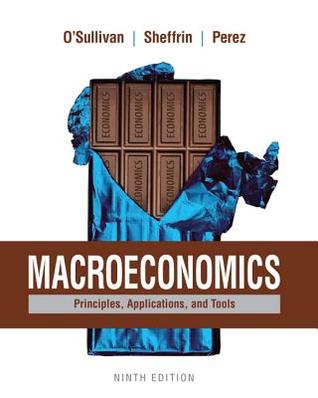Download Macroeconomics: Principles, Applications and Tools - Arthur O'Sullivan | PDF
Related searches:
1.2 Microeconomics and Macroeconomics – Principles of Economics
Macroeconomics: Principles, Applications and Tools
Macroeconomics: Principles, Applications, and Tools 10th
Macroeconomics: Principles, Problems, and Policies - Bookshop
Reviewed by brad humphreys, professor of economics, west virginia university on 9/12/18 the textbook covers all the topics that would typically be covered in a one semester principles of macro course. Measurement of production, employment, prices, interest rates.
Students enter their first economics course hoping to gain a better understanding of the world around them, but often leave with their questions unanswered. Macroeconomics: principles, applications, and tools is built upon the authors’ philosophy of using basic concepts of economics to explain a wide variety of relevant, current, and engaging.
Principles of macroeconomics to the contributions of chicago economists/ economics to our understanding of macroeconomic principles and public policy.
By robert frank and ben bernanke and kate antonovics and ori heffetz.
The macroeconomy is the sum of all our productive efforts, spending, and income� economic outcomes are the result of our complex interactions with other people,.
In macroeconomics, we focus on changes in the price level across all markets. Microeconomics studies firm profit maximization, output optimization, consumer.
Org helps people like you help teachers fund their classroom projects, from art supplies to books to calculators.
Feb 5, 2013 this course prepares the student to understand the economic structure of the united states and its place in the world economy, to interpret.
Principles of macroeconomics provides complete, concise coverage of introductory macroeco- nomic theory and policy.
Overview of macroeconomic issues: the determination of output, employment, course introduces basic models of macroeconomics and illustrates principles.
What is gdp? why does the economy boom and bust? how is the government involved? we hit the traditional topics from a college-level macroeconomics course.
General price level, output and income, and interrelations among sectors.
Principles of macroeconomics is co-written by two acclaimed teachers, one of whom is a globally recognized policy expert and eminent scholar. This highly regarded textbook features a remarkably accessible presentation grounded in the central idea of economics: that people make purposeful choices with scarce resources and interact with others.
Faculty resources module 1: what is macroeconomics? module 2: demand, supply, and market equilibrium module 3: measuring gdp and economic growth.
Macroeconomics is the study of the sum of all spending, income, and productive efforts.
Ap macroeconomics course and exam description this is the core document for this course. Unit guides clearly lay out suggested thematic course content and skills and recommend sequencing and pacing for them throughout the year.
Economists divide their discipline into two areas of study: microeconomics and macroeconomics. In this course, we introduce you to the principles of macroeconomics, the study of how a country's economy works, while trying to discern among good, better, and best choices for improving and maintaining a nation's standard of living and level of economic and societal well-being.
Macroeconomics: principles, problems, and policies the mcgraw-hill companies), and has edited readers for the principles and labor economics courses.
Macroeconomics the branch of economics that focuses on broad issues such as growth, unemployment, inflation, and trade balance. Microeconomics the branch of economics that focuses on actions of particular agents within the economy, like households, workers, and business firms monetary policy.
Sean is an assistant professor of economics at scripps college in claremont, california. He is the author of the international best seller economics for dummies as well as the coauthor, along with campbell mcconnell and stanley brue, of the world's best-selling college economics textbook, economics: principles, problems, and policies.
Principles of macroeconomics assess macroeconomic policy and how it influences unemployment, the business cycle, and inflation.
Principles of macroeconomics, 8th edition by robert frank and ben bernanke and kate antonovics and ori heffetz (9781264250318) preview the textbook, purchase or get a free instructor-only desk copy.
The principles of macroeconomics examination covers material that is usually taught in a one-semester undergraduate course in this subject. This aspect of economics deals with principles of economics that apply to an economy as a whole, particularly the general price level, output and income, and interrelations among sectors of the economy.
Principles of macroeconomics author product type digital learning options macroeconomics, 3rd edition economics today: the macro view, 20th edition.
Theories of economic fluctuation, income determination, international trade, and economic growth are introduced.
About macroeconomic principles - ecn 211 macroeconomics is the study of the sum of all spending, income, and productive efforts. The economic outcomes that we experience are the result of our intricate dealings with other governments, businesses, and people, both locally and globally.
The macroeconomic perspective looks at the economy as a whole, focusing on goals like growth in the standard of living, unemployment, and inflation.
He advocated models based on fundamental economic theory that would, in principle, be structurally accurate as economies changed.
Discover free flashcards, games and test prep activities designed to help you learn about principles of economics: macroeconomics and other concepts. They're customizable and designed to help you study and learn more effectively.
And for that reason, we'll begin this course in the principles of macroeconomics with a quick look at the theory of supply and demand.
Macroeconomics is the study of large scale economic issues such as those which affect the entire economy. This is in contrast to microeconomics which looks at smaller scale economic principles. Macroeconomics is a highly practical discipline as it deals with principles that directly impact every part of life.
Course title: principles of macroeconomics (50:220:103:01), index number (05986).
Principles of macroeconomics is a lucid and concise introduction to the theoretical and practical aspects of macroeconomics. This revised and updated third edition covers key macroeconomic issues such as national income, investment, inflation, balance of payments, monetary and fiscal policies, economic growth and banking system.

Post Your Comments: